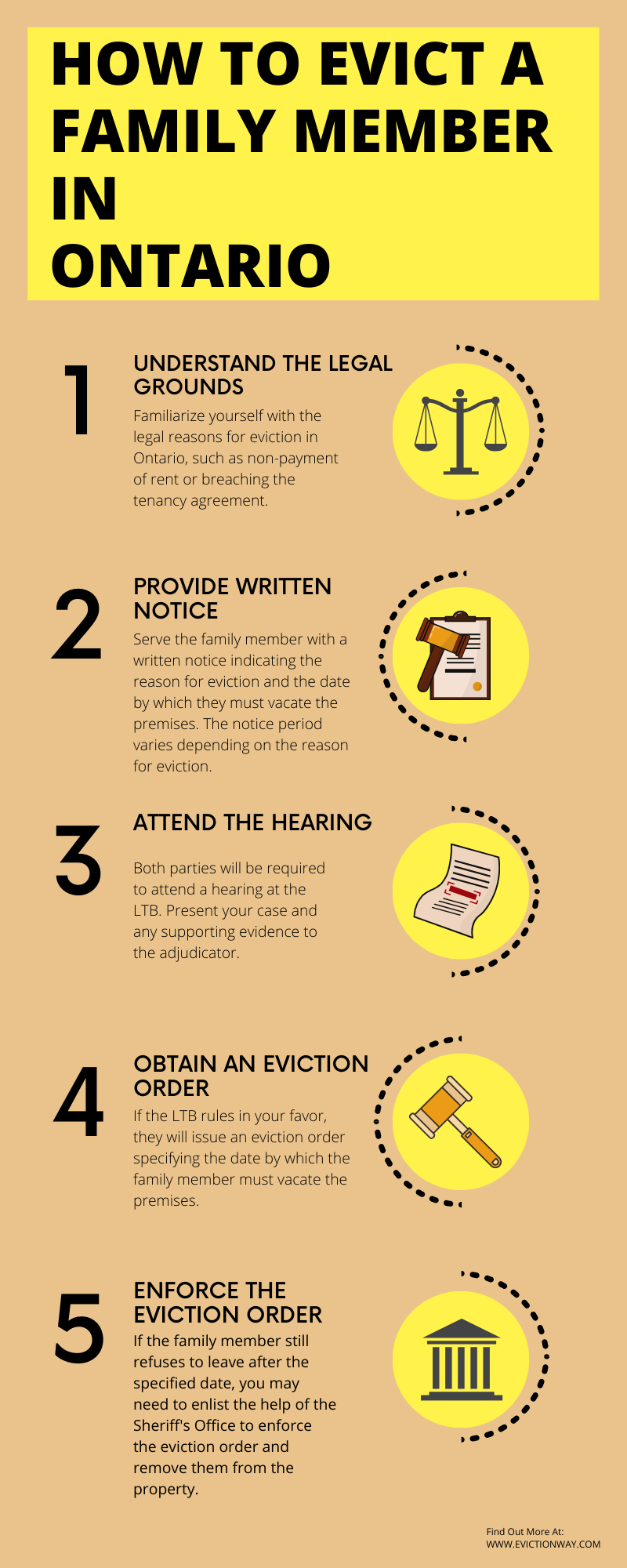Evicting a family member can be a difficult and emotional process, but it’s important to know your rights and options. In this article, we’ll discuss how to evict a family member in Ontario, including the legal process and tips for doing so politely.
If you’re considering evicting a family member, it’s important to first try to resolve the issue amicably. This could involve talking to your family member about their behavior, setting boundaries, or offering them support. If these efforts are unsuccessful, you may need to consider legal action.
The legal process for evicting a family member in Ontario can be complex, so it’s important to seek legal advice. A lawyer can help you understand your rights and options, and can represent you in court if necessary.

How To Evict a Family Member In Ontario
Evicting a family member can be a difficult and emotional process. However, it is important to remember that you have the right to protect your property and your well-being. If you are considering evicting a family member, it is important to follow the proper legal procedures.
1. Give Notice
The first step is to give your family member written notice that they must vacate the property. The notice must state the date by which they must leave and the reason for the eviction. The notice must be served in person or by registered mail.
2. File an Application with the Landlord and Tenant Board (LTB)
If your family member does not vacate the property by the date specified in the notice, you will need to file an application with the LTB. The LTB will hold a hearing to determine whether or not you have the right to evict your family member.
3. Attend the Hearing
It is important to attend the LTB hearing and present your case. You will need to provide evidence that you have given your family member proper notice and that you have a valid reason for evicting them.
4. Get an Order of Possession
If the LTB rules in your favor, they will issue an order of possession. This order will give you the legal right to evict your family member from the property.
5. Enforce the Order of Possession
If your family member does not vacate the property after you have obtained an order of possession, you will need to enforce the order. You can do this by contacting the Sheriff’s office.

6. Seek Legal Advice
If you are considering evicting a family member, it is important to seek legal advice. An experienced lawyer can help you to understand your rights and responsibilities and can guide you through the eviction process.
How Much Does it Cost to Evict a Family Member in Ontario?
The cost of evicting a family member in Ontario can vary depending on several factors, including the complexity of the case, whether or not you hire a lawyer, and the region in which you live.
| Cost Item | Estimated Cost Range (CAD) |
|---|---|
| Legal Fees (Lawyer Consultation) | $2000 |
| Filing Fees | $190 for in-person filing, $175 for online filing. |
| Sheriff’s Fee for Serving Notice | $400 |
| Potential Mediation Costs | $100 – $350 per hour |
| Potential Property Damage | Variable |
| Lost Rent (if applicable) | Variable |
| Additional Legal Expenses (if any) | Variable |

FAQs: Evicting a Family Member in Ontario
Here are some of the most frequently asked questions about evicting a family member in the Ontario:
What are the grounds for evicting a family member in Ontario?
In Ontario, you can only evict a family member if they have breached the terms of their tenancy agreement, such as by not paying rent or causing damage to the property. You cannot evict a family member simply because you no longer want them to live with you.
What is the process for evicting a family member in Ontario?
The process for evicting a family member in Ontario is the same as the process for evicting any other tenant. You must first give the tenant a written notice to vacate, which must state the reason for the eviction and the date by which the tenant must leave. If the tenant does not leave by the specified date, you can file an application with the Landlord and Tenant Board (LTB) to have them evicted.
What are the defenses to an eviction application?
There are a number of defenses that a tenant can raise to an eviction application, including:
- The landlord did not give proper notice to vacate.
- The tenant has not breached the terms of their tenancy agreement.
- The eviction is retaliatory.
- The tenant has a right to occupy the property under the law.

What happens if the LTB orders the tenant to be evicted?
If the LTB orders the tenant to be evicted, the landlord can obtain a writ of possession from the court. This writ gives the landlord the authority to have the tenant removed from the property by a sheriff.
Can I get help evicting a family member in Ontario?
There are a number of resources available to help you evict a family member in Ontario, including:
- The Landlord and Tenant Board (LTB)
- Legal Aid Ontario
- Community legal clinics
Related:
How to Evict a Family Member in South Carolina
